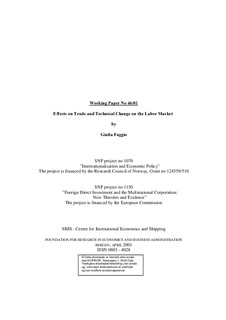| dc.description.abstract | The purpose of this paper is to analyze the impact of trade liberalization and technical change on the labor market, looking at the experiences of Poland, Bulgaria and Romania. Evidence suggests that both explanations receive some support. In Bulgaria and Romania, firms in industries with a high import penetration ratio destroy disproportionately more jobs than firms in industries with a low import penetration ratio do. In Poland, trade seems to have a positive effect on employment creation for firms located in industries with a high export intensity share. The effect of skilled biased technological change seems to be present in Polish manufacturing firms. Firms with high R&D intensity create more jobs on average than firms characterized by a lower R&D intensity. For the sample of Bulgarian and Romanian firms, it is difficult to identify a clear pattern. In this paper we also link job flow measures to a dynamic labor demand equation. Estimation results confirm the negative effect of trade and the positive impact of firm R&D intensity on job flow measures for the sample of Bulgarian firms. The results for Poland and Romania are less conclusive. | en |
